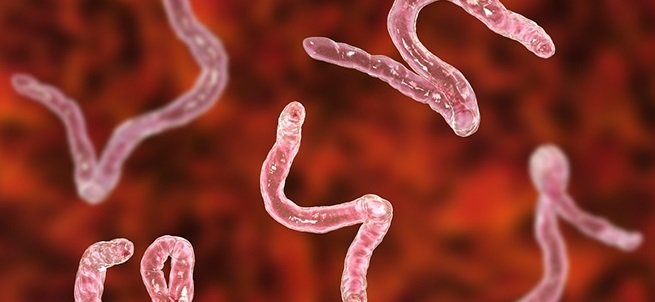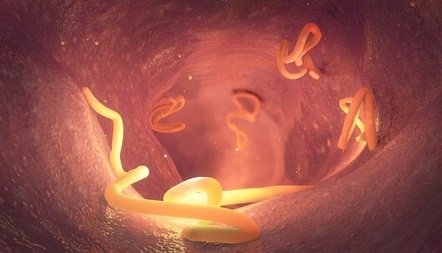Worm Infestation in Kids
Worm infestation/ Helminthiasis is one of the most common diseases affecting children. Although most worm infestations are mild and often asymptomatic, moderate to heavy worm infestations are generally associated with childhood malnutrition, anaemia, stunted physical and mental growth, psycho-social problems, and repeated gastrointestinal and upper respiratory tract infection.
The worms are a kind of intestinal parasite that makes their habitation primarily in the small intestine. The most common worm infections are Ascariasis (roundworms), Trichuriasis (whipworms), ancylostomiasis (hookworms), and Enterobiasis (pinworms).

How is it transmitted inside the intestine?

Worm infections are transmitted through the eggs getting released along with the human faeces (stool), which contaminate soil in areas of poor sanitation. So, some of the routes of exposure are-
-> improper hygiene
-> intake of contaminated food like undercooked meat/ vegetables & water, in which the human excreta is mixed through some route.
-> contact with an infected surface such as soil ( e.g., kids playing in the dirt barefoot and not washing hand properly after that.
What are the symptoms of worm infestation?
Each type of worm infestation has distinct symptoms. The majority of them are gastrointestinal symptoms, along with other signs and symptoms of worm infestation are –
- Abdominal distension,
- Nausea/ vomiting
- Vague abdominal discomfort
- Mental irritability, anguished child
- Diarrhoea & dysentery,
- Fatigue and anaemia
- Fatigue and anaemia
- Skin irritation, itching around the anus and vulva.
- Urticarial rashes
- The presence of worms hampers the person’s nutrition through food despite having nutritious food (i.e., decreased absorption of micronutrients, loss of appetite, weight loss, intestinal blood loss resulting in anaemia).
Each type of worm infestation has distinct symptoms. The majority of them are gastrointestinal symptoms, along with other signs and symptoms of worm infestation are –
Abdominal distension,
Nausea/ vomiting,
Vague abdominal discomfort
Mental irritability, anguished child
Diarrhoea & dysentery,
Fatigue and anaemia
Skin irritation, itching around the anus and vulva.
Urticarial rashes
The presence of worms hampers the person’s nutrition through food despite having nutritious food (i.e., decreased absorption of micronutrients, loss of appetite, weight loss, intestinal blood loss resulting in anaemia).
How is it diagnosed?
The gold standard diagnostic test for the evaluation of worm infestation is stool microscopy for direct egg detection and species identification. If the worms make their habitation anywhere other than the intestine, it is difficult to diagnose. And in such cases, multiple investigations are required depending on the presenting symptoms.
What are the preventive measures?
✓ Keep the surroundings clean.
✓ Train the child not to defecate in open places. Always use a toilet.
✓ Clean the child properly after passing the stool.
✓ Train the child to get into the habit of washing hands after using the bathroom and before eating.
✓ Consume only clean and boiled water
✓ Wash vegetables and fruits before eating.
Ask the child not to play barefoot in mud or dirty area, where we may suspect the possibility for contamination with faeces (stool) of infected persons.
How can Homoeopathy be of help in this condition?
There is excellent scope in the treatment of worms through homoeopathy. Numerous homoeopathic medications are available to cure the symptoms presented and deal with the complications arising due to worm infestation. Some of the important remedies are Calcarea Carb, Cina, Sabadilla, Spigelia, Teucrium, etc.
Homoeopathic medicines help to give relief without any side effects in the body. A well-qualified homoeopath can select the appropriate medication only after a thorough evaluation of the entire symptomatology. Kindly note, we do not encourage patients to experiment with homoeopathic medications. Self-prescription can prove harmful, and parents are not recommended to self-prescribe any of the Homeopathic medicines without consulting an appropriately qualified doctor from a recognized university.
There is excellent scope in the treatment of worms through homoeopathy. Numerous homoeopathic medications are available to cure the symptoms presented and deal with the complications arising due to worm infestation. Some of the important remedies are Calcarea Carb, Cina, Sabadilla, Spigelia, Teucrium, etc.
Homoeopathic medicines help to give relief without any side effects in the body. A well-qualified homoeopath can select the appropriate medication only after a thorough evaluation of the entire symptomatology. Kindly note, we do not encourage patients to experiment with homoeopathic medications. Self-prescription can prove harmful, and parents are not recommended to self-prescribe any of the Homeopathic medicines without consulting an appropriately qualified doctor from a recognized university.
Let our team of Let’s homoeopathy help you fight this disease.
So, do not hesitate and waste more time! Get a consultation with a qualified and experienced Homeopath today from the comfort of your home through Let’s Homeopathy. We will deliver the medicines to your doorstep too!